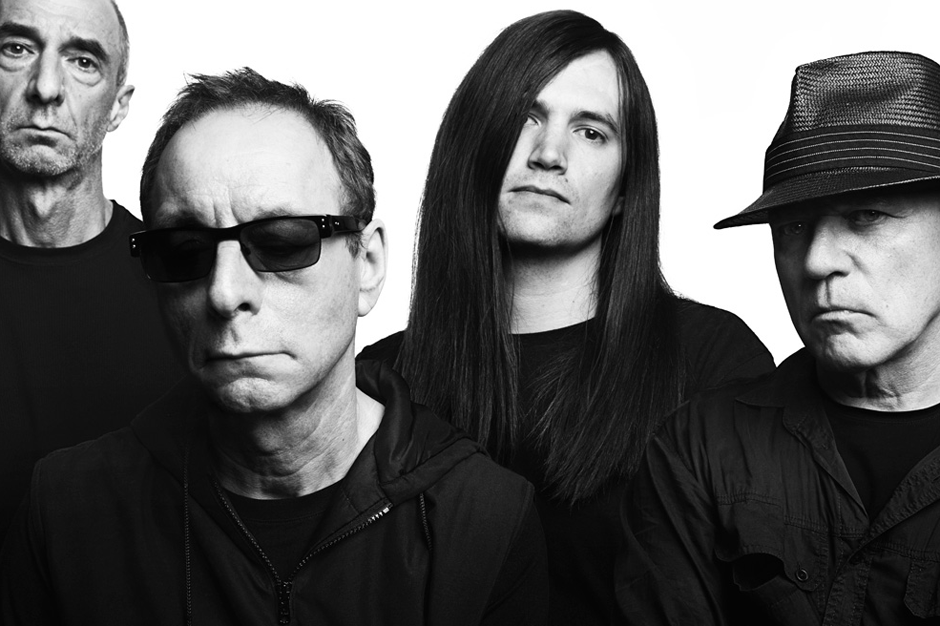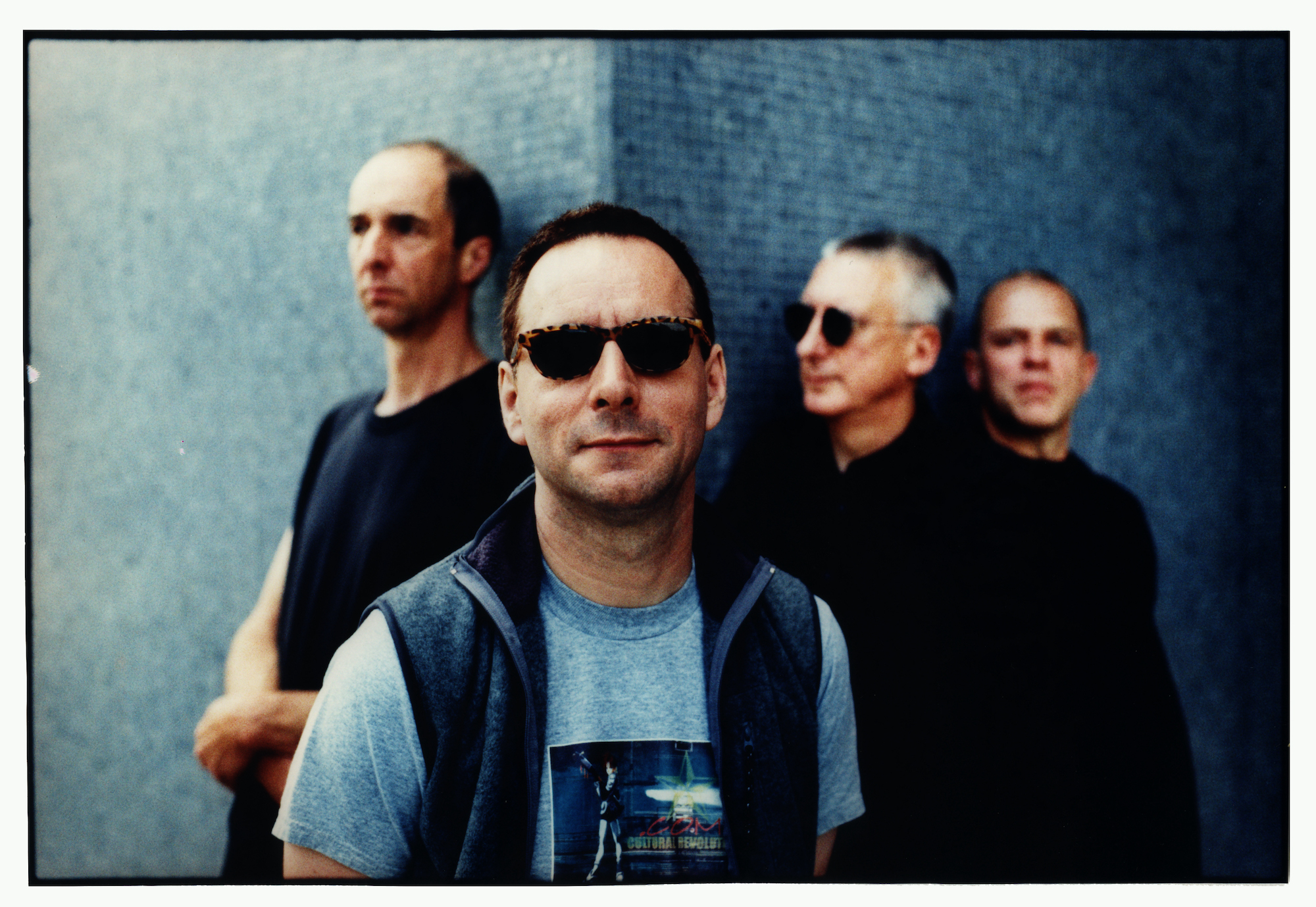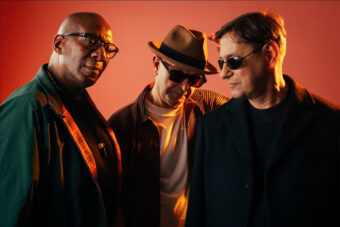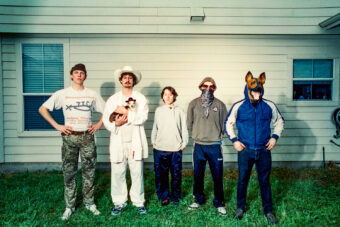Shape-shifting art-punks Wire have no desire to be just any one thing. Best known for their wildly different first three albums, released between 1977 and ’79 (Pink Flag, Chairs Missing, and 154), they’ve been releasing genre-spanning material and influencing other innovators — Sonic Youth, Guided By Voices, R.E.M., Minor Threat, and Manic Street Preachers, to name a few — for nearly 40 years (save for their first run’s five-year hiatus following 154, which ended in 1985).
Though many of their disciples have cited them as the forefathers of British post-punk, Wire have actively expressed little interest in defining themselves as one genre (“We pre-date the concept of genre music,” says Newman over the phone), or, unlike other acts who’ve been at it for decades, capitalizing on their history with an “anniversary tour.”
With the exception of one Pink Flag-themed show in the ’90s, Wire has always been careful to focus on the present. “There were quite a few bands who were contemporaries with us, late ’70s, early ’80s, who’d been making returns to the stage, having this whole heritage industry, or whatever you want to call it. People playing specific records,” bassist Graham Lewis says . “That’s not really something we were interested in. We always felt what we were doing now was the most interesting thing for us.”
Today, Wire are on the cusp of releasing their 13th studio LP, a self-titled effort that arrives on April 21 via the band’s own Pink Flag label. SPIN spoke to Newman and Lewis by phone about what fans can expect from Wire, and how to resist ageism in the music industry on your 40th anniversary.
You’ve had plenty of opportunities to self-title an album. Why do it on your 13th record?
Graham Lewis (bass, vocals): Well, being responsible for some of the titles myself, this time around, I couldn’t come up with a single one that justified being the title of the album. In the end, I think it was Colin who suggested that perhaps we should just call it Wire. And since I didn’t have anything better, I agreed. [Laughs.] It’s kind of like one of those solutions that you can only use once, and perhaps this is the opportunity.
Colin Newman (vocals, guitar): It’s a combination of two things. One is that we did the usual thing where we were trying to come up with a title by going through all of the lyrics. Every title suggested, one person liked but nobody else liked. We didn’t come to any conclusive answer on it. Then [album cover artist] Jon Wozencroft said, “Why don’t you self-title it?” Three people in the band were like, “We could come up with a lot worse idea.” The last person did need some convincing; the point that they made — which is the point that most people would make — was, “Why would you self-title a record that isn’t a debut?” But if you look on Wikipedia, it would take you two seconds to find that there are plenty of self-titled records that aren’t debuts.
I think Peter Gabriel called his first four albums, like, Peter Gabriel, which is actually entirely unhelpful… But I think the thing that convinced me was obviously the most famous non-debut self-titled record, which is the Beatles — an album commonly called the White Album. It was a great subversion of the name, putting it in that context. A white sleeve with an embossed name on it — that was stark. Nobody had done anything like that on record sleeves. That was high art. Band names go way beyond their meaning, but if you look at their name, it was just a terrible pun.
This is the poppiest I’ve heard Wire sound.
Lewis: I think the mix that Colin made is very poppy. I think it could have been heavier. I think it also has something to do with the fact that half the material we’d been playing, we wrote it and then actually took it out on the road. In 2013, when we came over to the States, there’s a track called “Blogging” that we wrote that in Chicago. Through the process of playing the song a lot on the road, it got very edited and concise.
I think it’s also about the selection of tracks on the album. We made some other tracks, and they weren’t left off the album because we didn’t think they were any good… They were left off because there just wasn’t room.
Newman: It’s darker. I think that’s just in the writing. That sounds almost naive and stupid to say, but there’s no planning that goes into it. It’s just the material that came out. We have the ability in-house, as it were, for the band to work up an arrangement to get recorded, and for me to work on the production and make it sound good. Nobody says, “Let’s go in this direction,” or, “We’re going in that direction.” Everything is dictated by the material. We actually worked on 19 tracks, and we ended up with 11. It wasn’t because they were less good. The aesthetic we were going for wasn’t exactly a pop aesthetic. It was more like a band aesthetic.
Graham, you wrote “Blogging.” It seems interested in Internet culture. How does someone “blog like Jesus”?
Lewis: We had just started the tour in 2013, and I was in a bar in Chicago having a couple of beers. I was just listening to the people in the bar talking, and I hadn’t been in America for very long. I’d been there for like 24 hours. I’d just begun tuning in to conversation patterns and what people were actually saying, and it was interesting to me coming from Sweden, which is probably one of the most atheist countries in the world. Coming to America and hearing people talk about technology, but also hearing people talking about God and religion. Not long before this, I think the Pope had made his first tweet, and it was a wondrous world we live in.
Do you guys ever pick album tracks based on an audience’s reaction to what you perform live?
Newman: No. It’s pretty obvious that [new song] “Harpoon” is different because people were literally going to the merch stand after the gig asking, “Where can we buy that track?” So you know already that you’ve got something that people are going to be expecting to have on the album. Do you know this English group called the Shadows? Somebody told me that they made their albums by market research. The songs are mainly covers… They would have, like, panels of Shadows fans and ask them which songs they should cover. I can’t imagine anything worse. This was happening in the last decade. The concept is taking something too far. There’s enough out there in the industry that’s heavily targeted.
One of my favorite things about Wire is how easily you slip from genre to genre. It makes you hard to classify.
Lewis: I think that’s called a “marketing nightmare.” Something for other people to endure. I think that’s simply because of the nature of people who are in the group, really. You have a wide interest in different music and different approaches, it comes as quite a natural and intuitive thing to do.
Newman: It’s an advantage from coming from an older generation. Actually, we pre-date the concept of genre music. It’s this thing that happened in the ‘80s, this concept that came about, which was incredibly powerful, bands thought that if they took a bit of this and a bit of that — a smorgasbord approach — and put it all together, that they would be able to create music like that. Some of it was can be quite successful, but the problem with that somewhat synthetic approach is, how do you then progress? You’ve already established what it is that you are.
You’ve said before that if there’s an anniversary for Pink Flag, you’re not interested in capitalizing on that. When you put out a new album, is there any particular marketing strategy to attract a new audience? Is that even a goal?
Lewis: I think we’ve always done the same thing. In some ways, I don’t think our attitude has ever changed. Of course the surprise now is, being together a little less than 40 years is a surprise in itself. In the early ’90s, we did one show in London where we played Pink Flag in its entirety. That was the first half of the show, and then we played our contemporary records the second half of the show. That was so we could collaborate with two sets of visual artists who designed the first and second half.
In that context, it worked really well because in a way you’re putting your work into an appropriate context. When we started to play more regularly, particularly in the States, we started to see there were generations that were coming to the show — the fans just weren’t of one age. It’s not just middle-aged men losing their hair or going grey. It’s a bit inspiring. [Laughs.]
Newman: We instinctively don’t target market at all. We know that the people who would [be interested in a new Wire album] come to a show. They would expect us to be playing a bit of new material — material from the new album that hasn’t been released yet. In a way, at all points of it, it’s why we’re a contemporary band. It may seem like an obvious thing to say, but in the past ten, 15 years, you’ve had the heritage thing. It can be very successful and make you a lot of money on the albums, but it’s an empty creation, in my view. It’s basically saying, “We’ve made a new album, but we don’t really care that much about it.” Why did you bother making a new record, then?
We make music because we want to make a new record and we have new things to say. That’s how it should be. I was having this conversation the other day, talking with, well, I won’t say who, but they had their main audience fame in the ’90s. And they played to quite a lot of people, but the promoter said that there wasn’t anyone there who wouldn’t have been there in the ’90s. So they’ve found their audience, they’ve had a big audience, and they’ve kept a big audience, but it’s the same people. There’s not a younger sect coming through, so I think it’s not just a problem for people who are as old as we are. I think it’s a problem across the industry. In order to combat that, as a band, you need to challenge that. Don’t say you’re important and that you’re excited about the new record — make bloody sure the new record is good.
Yeah, I’m excited to see you guys in Brooklyn. What kind of crowd do you guys typically get at your shows?
Lewis: I guess it will depend on how the hipsters are feeling on that particular night.
Newman: I think it depends on where we play, to be quite honest. If you’re seeing us in Brooklyn, that’ll be in the Music Hall of Williamsburg, that’ll be where we sell more tote bags than anywhere else in the rest of the world. I think it’s been mixed, actually. There are a fair few in their 20s and younger, and there are ones that are approaching our age, but it’s mixed. There are probably more people in their 40s than people in their 50s and 60s, I would say.
Do you think the band’s sound has been influenced by the lineup changes you’ve had over the years? How would you reconcile that?
Lewis: Well, we’ve only had two [lineup changes] — when Robert [Grey], the drummer, he left for a while, and then when Bruce [Gilbert, guitarist] decided he’d had enough. Not too many changes. We started working again, in 2008, with [guitarist] Margaret McGuinness, that was really very fun. Recently, of course, we’ve had [guitarist] Matthew [Simms] playing with us. He’s very much made himself part of the group. He’s considerably younger than we are, but fortunately he has a very, very, very wide range of music, and music that he also makes. He goes about making his music in a similar, intuitive way, as we do, so that makes things fun. I think on top of that, we’ve have had periods where we just have not worked together. There were periods where we didn’t have anything else to do, or we were just bored with it, that’s quite good advice, really: Don’t stop doing things that you don’t know what you’re doing.
Newman: [Simms] was just too good. This is the first album where Matt’s been involved in the whole process. It would be overstating to say that we’re in a Renaissance, but we are definitely getting somewhere, and I think that Matt is very much part of that. One British journalist did actually say to me that he thinks this is the best lineup of Wire ever, which would be sacrilege to so many people. But there is some truth in it, you know? It does work very well.
Any longterm relationship has good years and less good years.
Newman: Yeah, I think you’re right. I think the challenge for us is always the fact that we have such a strong history to come up with stuff that is strong and doesn’t have the 30 or 40 years of listening to it to back it up. It needs to be strong. I can’t emphasize that enough. There’s no point in a band like us being around if we’re not any good.
How would you know in the past when it was time to hold off on working on Wire and focus on something different?
Lewis: I think it’s usually pretty self-apparent. It can have everything to do with external circumstances as well as something internal. I think generally after a period of time, you tend to repeat things and you feel like… you don’t want to be a cover band of your own band. That’s people going through the motions, that’s not a good idea, that’s not a good example to set.
Have you experienced ageism in the industry?
Newman: It’s inevitable. Ageism is for the most part not practiced by the young, it’s practiced by the old. It’s the people who were, as it were, the center of the industry, who will be not young, because they wouldn’t have got to that level, but who just see that industry as a conveyer belt of young groups. It’s a bit of a cynical view. I think that because we just keep going and keep shoving it in people’s faces, we’re not going to quietly hide in the corner. It is incredibly important that we’re doing this. We are obsessed with music. We always have been. It goes back to day one. It goes back to the fact that when we started the band, we were a five-piece. It was somebody else’s band, who, due to a series of circumstances, we kicked out. And we had to make the band different from what it was before. It’s always been that thing: It’s gotta be different from what it was before.
Wire has influenced so many genres: the Misfits, Liars, R.E.M. Are you influenced by any contemporary acts?
Lewis: I don’t know about influenced by, but I’ve been listening to a lot of experimental electronic music. My daughter is a composer too, so that’s really the genre around our house. Going back to when we started playing together, I think we had very disparate influences, but one of the common ones was pop music from the ’60s, what we were brought up on. The early music from Germany: Neu!, Can, people like that. We’re big fans of Captain Beefheart, obviously. The very early Roxy Music stuff was good. At the time, when we actually started working together, we’d been doing things like Patti Smith’s first album, the Ramones, that stuff, Television.
What has kept you interested in this project for so long?
Newman: It’s a really good question because sometimes it can be really problematic. I think with that sense of when it’s good, it is really, really good, and everybody knows it’s good. It’s that kind of itch that you can’t really scratch, and you don’t know why. There’s something in Wire — and that may be something to do with the fact that we haven’t had any hits, we’ve never been like, a big band — it keeps us hungry.
Over the course of your career, whether it’s solo or with Wire, is there anything you’d look back on and change?
Lewis: Is that change rather than regret? [Laughs.] I think there were things, perhaps; it’s always easier to look back on them in hindsight. “If I’d done this, that, the other.” I think it’s one of those things where if you’re going to be an artist, then you are going to continue to look towards the future already. It doesn’t benefit to look too far back, regret many things — it’s never terribly helpful.
Will you do anything for your 40th anniversary?
Newman: Oh, we’ll do an album for sure.





